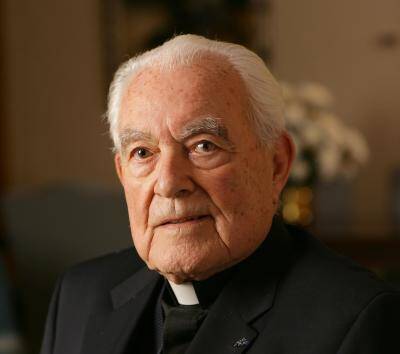The University of Notre Dame website went dark on Feb. 26, its usually lively front page replaced by an image of Theodore Hesburgh, C.S.C., and a quotation from him: “I never wanted to be anything but a priest, which is in itself a great and unearned grace. I hope to live and die a priest, nothing more, but nothing less either.”
Father Hesburgh, among the most influential Catholic priests in the history of the American church, had passed away at Holy Cross House on the campus of his beloved university at the age of 97, a priest of the Congregation of Holy Cross for 71 of those well-packed years.
As a Catholic leader in the U.S. civil rights movement, a social activist and advisor to presidents and popes, a consistent innovator in higher education and, at 35 years, the longest-serving president of the University of Notre Dame, Father Hesburgh had an influence across a remarkable array of social, educational and economic developments in contemporary U.S. life.
The University of Notre Dame’s current president, John Jenkins, C.S.C., said in a statement announcing Father Hesburgh’s passing, “Notre Dame lost a piece of its heart today, but Father Ted’s spirit lives on at Notre Dame and among the millions of lives he touched around the world.”
Father Hesburgh was born on May 25, 1917, in Syracuse, N.Y. He was educated at Notre Dame and the Pontifical Gregorian University in Rome and was ordained in 1943. Hesburgh became president of Notre Dame in 1952. By the end of his tenure he had transformed the university, nearly doubling its student body, moving it to mixed lay and religious governance in 1967 and in 1972 admitting women students to the university for the first time, noting in his wry way, “If we say we are educating for leadership, we ought to educate the other half of the human race.”
Father Hesburgh rose to national prominence because of his vanguard role on civil rights. He was a founding member of the U.S. Civil Rights Commission in 1957 and was photographed joining hands with Martin Luther King Jr. at a civil rights rally in Chicago in 1964, singing “We Shall Overcome.” His efforts to promote lay leadership and academic independence at Catholic universities was also groundbreaking, while literal groundbreakings came to be regular occurrences at Notre Dame under his leadership, including the groundbreaking for the 14-story library that today bears his name.
So wide were his social interests—from nuclear proliferation to civil rights to economic development—and so numerous his Vatican and political appointments that a joke regarding the globe-trotting university president began to circulate on campus: “What’s the difference between God and Father Hesburgh? God is everywhere. Father Hesburgh is everywhere but Notre Dame.”
In a statement on Feb. 27, President Obama wrote: “Father Hesburgh inspired generations of young men and women to lead with the courage of their convictions. His deep and abiding faith in a loving God, and in the power of our shared humanity, led him to join the first-ever United States Civil Rights Commission, and join hands with Dr. King to sing ‘We Shall Overcome.’ His belief that what unites us is greater than what divides us made him a champion of academic freedom and open debate.”
A warm remembrance from former President Jimmy Carter on Feb. 27 suggests the great breadth of Father Hesburgh’s interests and pursuits on behalf of peace and justice: “Father Hesburgh has devoted his long and consequential life to serving humanity, always taking courageous stands on the serious moral issues that have faced our nation and the world—from his fight for civil and human rights and against nuclear proliferation and global hunger to his ongoing efforts to seek peace among people in conflict.... His vocal concern regarding the treatment of immigrants led me to name him chair of the Select Committee on Immigration and Refugee Policy, and his recommendations served as the basis of crucial congressional reform legislation.”
President Carter added that Father Hesburgh helped “spearhead relief efforts that averted mass starvation among Cambodian refugees” and served for him on U.N. development and technology conferences. He said, “Father Hesburgh has made the world a better place—for those of us whose lives he has touched directly and as an inspiration for generations to come.”








